QuestionI have an albino leopard gecko who I rescued from someone whose rat bit him (this was months ago and he seems to be completely healed and has been happy until recently. He does move around when we take him out - albeit slowly - he never has been a fast mover, not like our smaller leopard gecko who has a grand time doing all kinds of things - he doesn't really climb on his netting - never has - bought him a new vine (artificial to climb) Anyway, when the weather got colder I had him by a window which I thought I had kept him warms enough (at that point I did not have a thermometer in his cage) but I'm wondering if that is the problem - I moved him 5 days ago and now the thermometer reads 75 to 83 during the day with a 60 watt incandescent light. He shed 4 weeks ago and defecated on 11/3. The substrate is shredded coconut shells. - his tail is nice and fat. The under tank heater is in the middle of the tank (20 gal) with his house on one end and the water on the other side. I used to feed him crickets but recently hve given him mealworms and have him eat them while I have him out - should I just put worms and crickets in the cage at night and let him eat at his leisure? I have been trying every day to feed him to no avail.I took some powdered calcium and mixed it with water and put it in his mouth sideways and he licked it - wanted to get that calcium in him. He is a captive breed and is about 3 years old.
It's just that he is acting so differently - is it possible he needs to recover from possibly being too cold? Do not know of any visits to the vet. No supplements. Not sure of humidity level - have no humidity gage.
I believe I've covered everything. Thank you so much for being there. It's amazing how much you can love an amphibian.
AnswerThe Leopard Gecko is not an amphibian at all. It is a reptile that lives in the deserts of Afghanistan and Pakistan, and less commonly in northern forested areas of India.
If you are under the impression it is an amphibian, your care will be all wrong. And if you are using damp coconut fiber substrate, which is commonly used for it's ability to retain humidity, this could be a problem. It could cause a respiratory infection. I would also point out that if this were an amphibian, and you weren't aware of the humidity, then this would be all wrong as well. I have to recommend that you do some basic web searches on care for Leopard Geckos before you do anything else.
Dry coconut fiber may be acceptable as a substrate, with a water dish and humid cave hide provided that has frequently dampened substrate for shedding purposes.
Next thing is that you mentioned a vine for climbing. Leopard Geckos are not arboreal. They will not and should not climb vines, branches, netting etc. This is a basic 101 fact, which leads me to believe that you obtained these animals and never did any real study of their care requirements and preferences. They are not climbers like most other geckos are and they don't have the footing that others do. Leopard Geckos can easily fall and be seriously injured or killed. They should be provided a basking rock or two stacked, and this they can safely climb. Again, not having a complete understanding of the animal you have, seems to have led to some errors in providing the proper care, and this is a hazard for the animal if you are not up to speed on it's care.
If the gecko was bitten by a rat, then it should have been checked out by a vet and it should have been put on antibiotics. I can't see the bite from a rat on a Gecko being a minor wound. It was probably quite significant. Geckos have thin and tender skin and they are easily injured. I wouldn't be surprised if there was internal injury of some kind, and no doubt it was painful, and may still be causing the gecko pain. In addition, infection is highly likely.
You should never be providing heat from sunlight through a window. That is a fast way to overheat and kill an animal that is inside an aquarium. Glass and plastic retains and magnifies heat. Use the proper lighting, and use thermometers. Do not use windows.
At this point I can't reliably guess what is happening to the gecko. The basic care has been off, heating was previously provided from a window, and I don't know if the gecko might have suffered heat stress and has cerebral edema. There is also a recent injury from a rat, and there is no indication of vet treatment for that wound, so infection or internal injury is a high probability.
What you should do is verify your care is correct first of all, including temperature, and that the gecko is not impacted or dehydrated, that it is receiving the right size prey (which is half the size of the head or smaller. The calcium is not likely going to be of any help and would not make my short list for what is wrong here. This is likely the result of the previous injury, and/or improper environmental conditions.
See the following links:
http://www.anapsid.org/leopardgek.html
http://www.leopardgecko.com/leopard-gecko-care
http://www.leopardgeckocare.net/
The one thing I primarily disagree with related to most Leopard Gecko care sites, however, is their common suggestions that they don't need "any" UVB lighting. This is false and completely dismissive of common sense. There is no such thing as a reptile that lives in a dimension devoid of all sunlight in the wild. All reptiles and all terrestrial dwelling animals need sunlight and the UV that it contains. Also, Leopard Geckos are not strictly nocturnal. They are primarily active at night, while hunting, but they do come out by day, and they do sometimes bask, and they do receive UVB even in their dens in the wild. Even moonlight provides some UVB. There are diurnal reptiles who have higher UVB requirements, and there are nocturnal ones that have "reduced" UVB requirements compared to diurnal ones. That does NOT mean that nocturnal reptiles don't require UVB. Anyone who advises otherwise doesn't know what they are talking about.
If you would like me to perform a more in depth assessment of this gecko, I offer a consultation service through my website (wichitafallsreptilerescue.webs.com). You may email me photos and preferably video of the gecko and I may be able to help further.

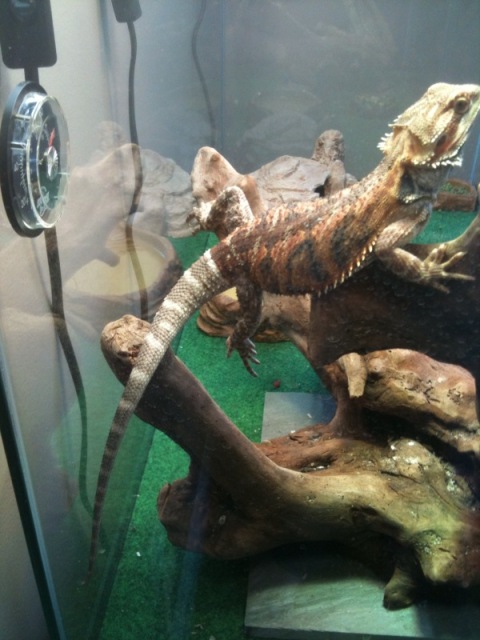 bearded dragon tail turned white
QuestionBDs white tail
QUESTION: My 8 month old
bearded dragon tail turned white
QuestionBDs white tail
QUESTION: My 8 month old
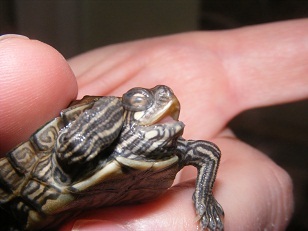 my turtles mouth
Question
my turtle
my baby turtle as a mouth problem, I
my turtles mouth
Question
my turtle
my baby turtle as a mouth problem, I
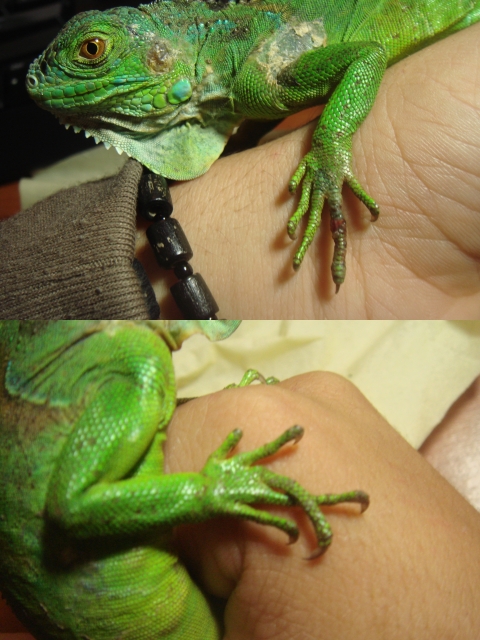 Iguana toe problem...
Question
toe problems
Hey there,
I adopted a baby iguan
Iguana toe problem...
Question
toe problems
Hey there,
I adopted a baby iguan
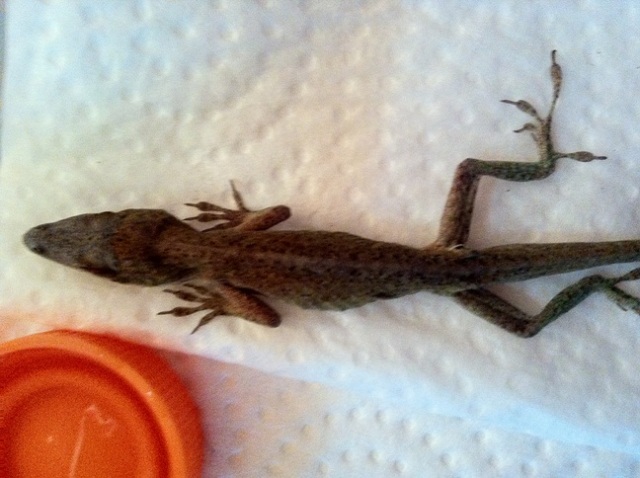 Very skinny anole
Question
Green anole
We noticed this morning tha
Very skinny anole
Question
Green anole
We noticed this morning tha
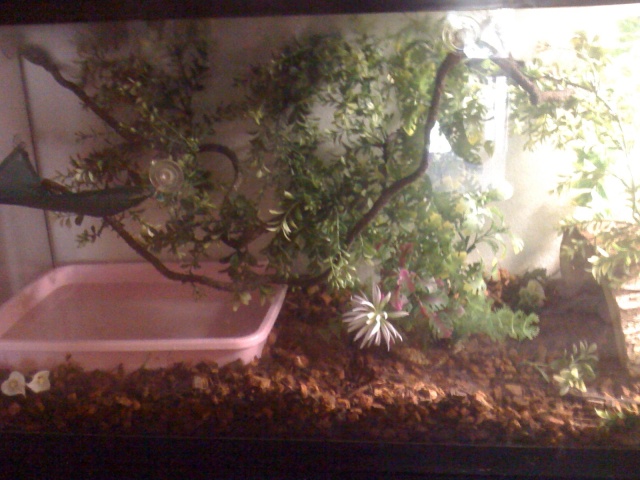 Chinese Water Dragon Not Opening Eyes
QuestionQUESTION: Hello, my name is Morgan and Im an ow
Chinese Water Dragon Not Opening Eyes
QuestionQUESTION: Hello, my name is Morgan and Im an ow